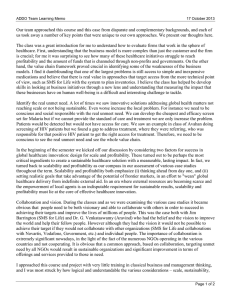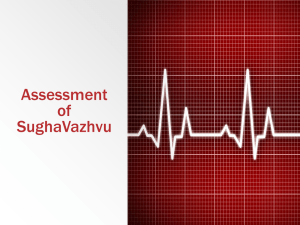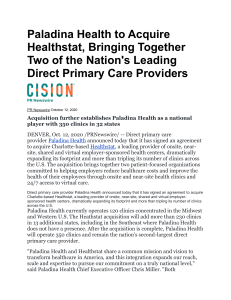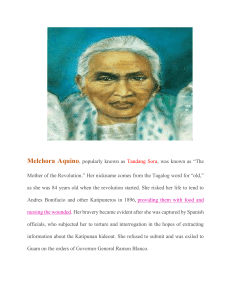Document 13627273
advertisement
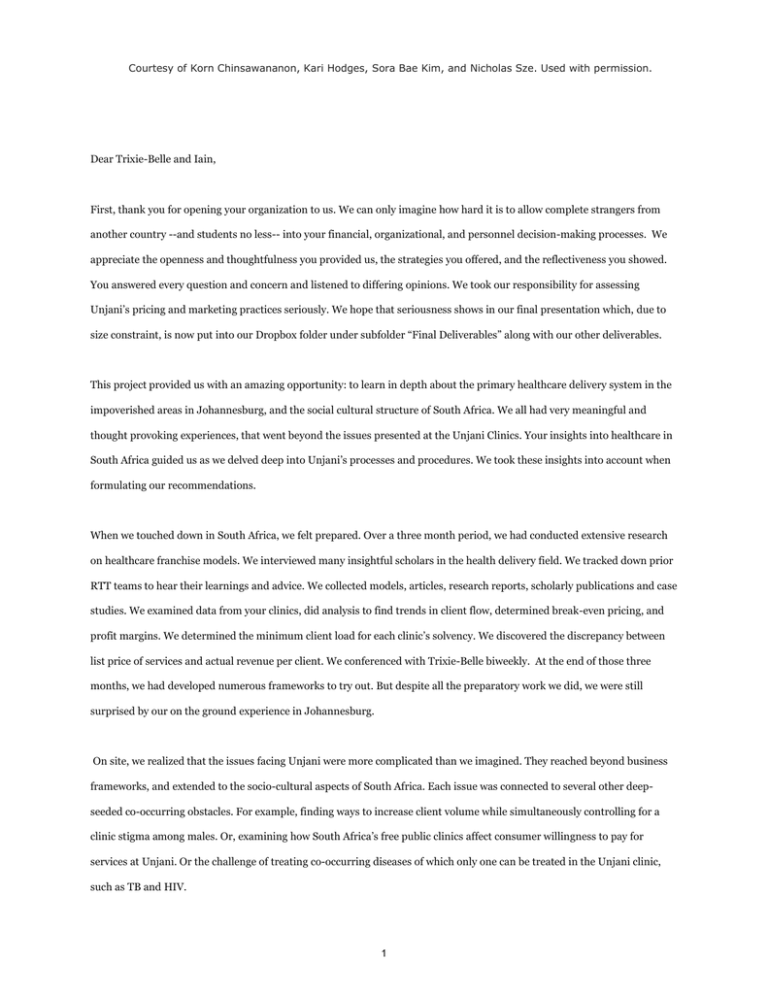
Courtesy of Korn Chinsawananon, Kari Hodges, Sora Bae Kim, and Nicholas Sze. Used with permission. Dear Trixie-Belle and Iain, First, thank you for opening your organization to us. We can only imagine how hard it is to allow complete strangers from another country --and students no less-- into your financial, organizational, and personnel decision-making processes. We appreciate the openness and thoughtfulness you provided us, the strategies you offered, and the reflectiveness you showed. You answered every question and concern and listened to differing opinions. We took our responsibility for assessing Unjani’s pricing and marketing practices seriously. We hope that seriousness shows in our final presentation which, due to size constraint, is now put into our Dropbox folder under subfolder “Final Deliverables” along with our other deliverables. This project provided us with an amazing opportunity: to learn in depth about the primary healthcare delivery system in the impoverished areas in Johannesburg, and the social cultural structure of South Africa. We all had very meaningful and thought provoking experiences, that went beyond the issues presented at the Unjani Clinics. Your insights into healthcare in South Africa guided us as we delved deep into Unjani’s processes and procedures. We took these insights into account when formulating our recommendations. When we touched down in South Africa, we felt prepared. Over a three month period, we had conducted extensive research on healthcare franchise models. We interviewed many insightful scholars in the health delivery field. We tracked down prior RTT teams to hear their learnings and advice. We collected models, articles, research reports, scholarly publications and case studies. We examined data from your clinics, did analysis to find trends in client flow, determined break-even pricing, and profit margins. We determined the minimum client load for each clinic’s solvency. We discovered the discrepancy between list price of services and actual revenue per client. We conferenced with Trixie-Belle biweekly. At the end of those three months, we had developed numerous frameworks to try out. But despite all the preparatory work we did, we were still surprised by our on the ground experience in Johannesburg. On site, we realized that the issues facing Unjani were more complicated than we imagined. They reached beyond business frameworks, and extended to the socio-cultural aspects of South Africa. Each issue was connected to several other deepseeded co-occurring obstacles. For example, finding ways to increase client volume while simultaneously controlling for a clinic stigma among males. Or, examining how South Africa’s free public clinics affect consumer willingness to pay for services at Unjani. Or the challenge of treating co-occurring diseases of which only one can be treated in the Unjani clinic, such as TB and HIV. 1 These unforeseen obstacles forced us to push deeper into South African culture, history and politics all while creatively problem-solving. We revamped our assessment and analysis tools on the ground. We redesigned our surveys on site and retested them in the community. We shifted the interview questions we asked of community members, nurses, and competitors. We adjusting our pricing models assumptions and strategies. And we were rewarded for our efforts with rich data that allowed us to gain true insight into the healthcare delivery market and Unjani’s future battle. For pushing us to be this nimble and creative, we are extremely grateful. This nimbleness made us brave: we walked the streets of Etwatwa translator-less carrying groceries and buying grandpa powder in exchange for respondent answers. It made us curious: Mmabatho translated questions in a multitude of ways to determine core issues of concern. Most importantly, this nimbleness made us better researchers and students. We were pushed to iterate on the ground, justify our conclusions and test our recommendations, even handing out flyers ourselves. And it is for this-- helping us become brave, curious, result driven researchers-- that we are most thankful. This was a great opportunity. Thank you for your generosity. Baie dankie, Korn, Kari, Sora and Nick 2 MIT OpenCourseWare http://ocw.mit.edu 15.S07 GlobalHealth Lab Spring 2013 For information about citing these materials or our Terms of Use, visit: http://ocw.mit.edu/terms.

